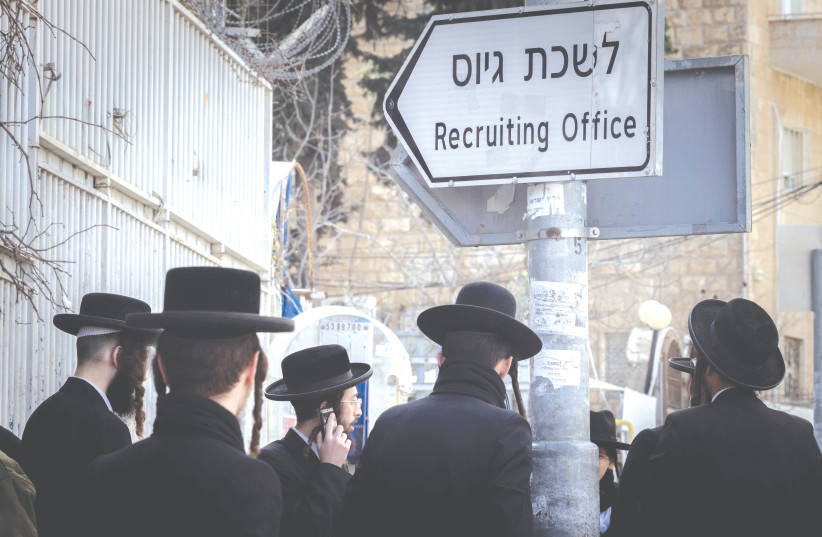Gallant applauded as he votes against his coalition’s haredi draft law
Defense Minister Yoav Gallant voted against his party, coalition, and the revival of an old haredi draft bill late Monday night, which was approved by the majority of the Knesset despite his rebellion.
Gallant was applauded but immediately left the Knesset chamber after his vote, which led to a final tally of 63-57 to implement the Rule of Continuity procedure for the January 2022 security service law amendment to integrate yeshiva students.
Otzma Yehudit MK Almog Cohen, who had retreated from threats that he would not vote with the coalition, shook Gallant’s hand and gave him a look of sympathy as the minister departed. Cohen’s vote in favor of the continuance of the bill came as opposition MKS and leaders had urged coalition members to follow Gallant’s lead.
In accordance with the procedure, which allows for the advancement of a bill that had been previously been approved in plenum readings but abandoned by the Knesset’s dissolution, the legislative remnant from the previous Israeli government will be transferred to the Foreign Affairs and Security Committee for preparation for further plenum readings.
Opposition leader Yair Lapid slammed the vote that had dragged on into the late hours of the night as a one of the most “despicable” moments of the Israeli Knesset — it had allegedly failed to stand by its values in favor of politics.
“The biggest sin is this government that dares to speak on behalf of [IDF] fighters,” said Lapid. “Today the IDF announced that it needs 15 battalions. Where are we going to get them if this government encourages order refusal and draft dodging? At least don’t talk about your commitment to the fighters and then come here and pass laws on order refusal and draft dodging. Today the Israeli Knesset stands before more than 500 soldiers who were killed, in front all the people who did 180 days of reserve duty – and the coalition will say we don’t care about you, you don’t interest us.”
Ultra-Orthodox draft evasion

Yisrael Beytenu leader Avigdor Liberman attacked the refusal by ultra-Orthodox leadership to embrace military service.
“I have never understood why a Jew is not allowed to be a combat soldier. Where does this appear in the sources? I have found no trace of military service being contrary to Judaism. All the great Jewish leaders were all warriors,” said Liberman. “You do not care at all about the Torah, there is nothing Jewish about this. All this to me how this draft dodging is anti-Jewish and anti-Zionist. We lost a full brigade — killed, injured. The security situation requires an increase in the manpower of the IDF. Evasion of everything, military or civilian service — this is the most anti-Jewish thing.”
Security Committee Chairman MK Yuli Edelstein said that as Israel faced complex challenges, it was part of the political leadership’s job to provide an accurate response to the security needs of the state of Israel.
This is a historical turning point for the people of Israel. It is necessary and we have no other choice. We all need a big, efficient and strong IDF and a big, efficient and strong IDF needs us all,” said Edelstein. “We will do this in a clean, matter-of-fact manner and with the full cooperation of all actors.”
The security service law amendment to integrate yeshiva students would raise the age of exemption to 22 after two years, and again to 23 years a year later. Ultra-orthodox youth would be offered alternative enlistment routes with the national emergency and rescue service, or a shortened three month or three week service. This would circumvent combat roles, which require several more months of training for qualification.
The bill also introduced escalating consequences for religious schools that did not comply with enlistment quotas and regulations, with a 20% decrease in government funding that would grow with consecutive years of violations.
The law went through first reading during Lapid’s tenure in a shared administration with then-alternate prime minister Naftali Bennett, but opposition members argued that the October 7 Massacre had changed the Israeli paradigm and the legislation was obsolete.
Coalition members also changed their position on the legislation, with MKs like Degel HaTorah leader Moshe Gafni arguing in the Budget Committee on Sunday that the opposition only sought to topple the government after the withdrawal of National Unity party from the wartime emergency government and the coalition faced a March High Court interim order over military exemption for ultra-orthodox men in the wake of the April legislation deadline and a July 2023 draft law expiration.
Opposition members had agreed with Gafni that their objective was to topple the coalition. National Unity, Yesh Atid, and Yisrael Beytenu had introduced motions of no-confidence against the government because of the economic situation, but discussion of the state economy, Israel-Hamas War prosecution, and the haredi draft law were the predominant topics in every plenum debate and discussion, as well as the focus of faction meeting statements and Knesset Committee deliberations.
Gallant’s rebellion came in the wake of MK Benny Gantz’s National Unity’s withdrawal from the emergency government, allegedly over Netanyahu’s handling of the war with strategic decisions being “met with hesitance and procrastination due to political considerations.” Gantz called for elections to be held the coming fall.
Coalition members who agreed with Prime Minister Netanyahu’s longstanding warnings that an election would mean the end of the war, criticized Gantz for the move that they said was greeted by enemies in Gaza. National Security Minister Itamar Ben-Gvir, however, argued before the plenum that Gantz’s departure was an opportunity, claiming that the false unity that Gantz provided had held back the coalition from decisive victory in the war. Ben-Gvir and his allies had opposed Netanyahu’s recent condoning of a three-phase hostage deal with Hamas, which Gantz had supported.





Comments are closed.